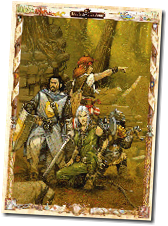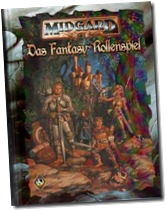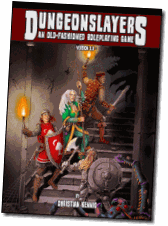 Repeatedly people have asked me to write an article about German roleplaying games. I have to admit I avoided to write this post for a long time, mainly because I don’t feel that closely connected to the German RPG industry. In the last twenty years or so I mainly played English-language RPGs or translations of English-language RPGs. I played Das Schwarze Auge (aka The Dark Eye) once and I never played Midgard, even though I own the books. The only German RPG that I play often is Dungeonslayers.
Repeatedly people have asked me to write an article about German roleplaying games. I have to admit I avoided to write this post for a long time, mainly because I don’t feel that closely connected to the German RPG industry. In the last twenty years or so I mainly played English-language RPGs or translations of English-language RPGs. I played Das Schwarze Auge (aka The Dark Eye) once and I never played Midgard, even though I own the books. The only German RPG that I play often is Dungeonslayers.
Ok, let’s start by the most successful German pen & paper roleplaying game: Das Schwarze Auge. It’s first edition has been released in 1984 and was written by Ulrich Kiesow. I think it’s safe to say that DSA is in Germany what D&D is to Americans. The vast majority of German players have played DSA and in many cases it’s the only RPG they ever played.
DSA is currently available in it’s Fourth Edition which is supposedly much more flexible in terms of character creation. But from what I’ve heard the rules are also much more complex. But far more complex than the rules is the official setting of DSA: Aventurien (aka Arkania).
Over the years countless supplements have been released that provide the GM with a ridiculous amount of details. As someone put it on Google+ recently: You can actually look up the name of the pets of every innkeeper in Aventurien if you wish to do so. This might be a exaggeration, but it’s really a slight one.
This could actually be a good thing, but in reality it makes it very hard for new gamers get into the game. From what I’ve gathered a majority of DSA fans actually cherishes that level of detail and changing anything to fit your campaign is frowned upon. Most published DSA adventures also made railroading into an art form. Players are not meant to influence the story too much and obviously the majority of DSA fans is happy with that.
Again I have to admit I am no DSA player myself and some of the things I wrote may come from my skewed perspective. I’ve talked to a lot of people that actually played DSA (sometimes for many years) and I am just repeating what they said. Perhaps someone with a deeper knowledge of the game can help to clear up some misconceptions in the comments below.
 The second most well-known German RPG is Midgard. Even if the name suggests it, it doesn’t have anything to do with Norse mythology or Wolfgang Baur’s upcoming campaign setting for Pathfinder and AGE. Midgard actually predates DSA by 3 years, which actually surprised me. I always thought DSA was the first major German RPG. But that shows how much I know. 😉
The second most well-known German RPG is Midgard. Even if the name suggests it, it doesn’t have anything to do with Norse mythology or Wolfgang Baur’s upcoming campaign setting for Pathfinder and AGE. Midgard actually predates DSA by 3 years, which actually surprised me. I always thought DSA was the first major German RPG. But that shows how much I know. 😉
My love affair with Midgard was a very short one. A friend of mine loves the system and kept telling me about his Midgard gaming group. So one day I caved in an ordered the three core rulebooks. A few days later I got three very nice-looking hardcover books. Alas my joy ended when I started reading the rules. Midgard – even in it’s 4th edition – feels like a very old game. And it is pretty complex. What makes things even worse is that the designers love to use abbreviations before explaining them.
Some time later I made the mistake of buying the Perry Rhodan roleplaying game based on the Midgard rules. If you are interested to learn how this worked out, check out this post. Let’s just say that Midgard is not my cup of tea.
 A game that I actually like a lot is Dungeonslayers. Yes, the name sounds a bit weird, especially since you don’t slay any dungeons in that game. Dungeonslayers was created by Christian Kennig only a few years ago and is available for free in PDF format in various languages. I stumbled upon it in 2009 (check my playtest report from back then) and immediately fell in love with it. It has an old school charm even though it’s a modern game and even though the name implies a focus on hack and slay it’s a fully-fledged roleplaying game that allows everything from dungeon romps to a campaign focused on mystery or intrigue.
A game that I actually like a lot is Dungeonslayers. Yes, the name sounds a bit weird, especially since you don’t slay any dungeons in that game. Dungeonslayers was created by Christian Kennig only a few years ago and is available for free in PDF format in various languages. I stumbled upon it in 2009 (check my playtest report from back then) and immediately fell in love with it. It has an old school charm even though it’s a modern game and even though the name implies a focus on hack and slay it’s a fully-fledged roleplaying game that allows everything from dungeon romps to a campaign focused on mystery or intrigue.
The current 4th edition was the first one to be released in print and was a smash hit. The first printing was sold out in no time. The second printing was actually released as a boxed set that includes the softcover rulebook and additional materials like an introduction for new players.
While I doubt that even Dungeonslayers can topple DSA from it’s throne as Germany’s most successful RPG, I think it has good chances to make second place if it hasn’t reached that position already.
Of course these three games are only the tip of the iceberg. In recent years the German RPG scene has been quite active. But for some reason it’s still not as vibrant as the English-speaking RPG community. But from what I’ve seen in the past years this might be about to change.

I’ve got to raise the banner for Austrian game designers as well. AceOfDice (that would be me) has recently released Destiny Beginner in English, and Destiny Dungeon is already being translated. And there are other excellent games in the making, some of them will hopefully be translated into English as well.
Michael,
Thank you for starting this series (hopefully), of covering German-language RPGs.
I first played DSA in a boxed set format perhaps a year or two after its release, when my sister, studying in Tubingen, sent it home for my birthday. We enjoyed the slightly different take on a very familiar rules-set, and played a few times.
I’ had no idea about Midgard’s existence.
I’m hoping to find out more about the UFO game, Contact, I believe. 😀
When everything goes as planned I will write a post about Contact in the near future. I also asked the author to do an interview. 🙂
Yay,
Finally Michael.
Vielen Dank! Herr Sterngucker
Will have a nice read when I get home.
All the best.
My only experience with DSA is through the Drakensang PC games. I particularly loved the second one, River of Time, and its expansion.
Obviously, the game was doing all the number crunching, but I really enjoyed the world that was presented.
Well, I’m one of those that started with DSA. We played 2.0/2.5 until shortly after 3rd came out officially, then switched to Shadowrun 2 and MechWarrior 2 due to fatigue with DSA and fantasy in general.
I’ve been checking in on what happened with the game sporadically but I haven’t played DSA in a long time, so you may take the following with a grain of salt.
The complexity of the rules – while quite different – in their incarnations follow a similar curve from 0E to 3.5; the current 4.1 matching the latter with all the crunchy bells and whistles. Bug or feature? You decide.
Oh, and you will need to buy quite a few books if you plan on running the game, so the supplement treadmill is also similar to D&D. The DSA Basisregelwerk won’t get you very far.
The setting is very…german and/or european, for lack of a better term. The designers drew heavily on real world history and folklore. I’m not saying that this is bad, but it means that the style, tone and contents are notably different to the american ‘high fantasy western europe pastiche’ that is D&D.
Over the years, a huge amount of official fluff and meta plot information has been published. Most fan(atic)s seem to like this, others…not so much. The older adventures are pretty railroady, and from what I gathered that hasn’t changed much with the current ones.
I guess that’s pretty much it – but let me add that I also enjoyed the two Drakensang games (including the expansion). They do a good job introducing people to the setting, even if there are quite a few rough edges to them (which are solely the fault of the designers of the video games).